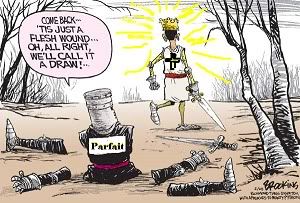conversationpc wrote:Rip Rokken wrote:Lee Strobel's athiest-to-believer story is inspiring, but from what I've read, he wasn't really well versed in either athiesm or Christianity to begin with. He had little knowledge either way. He converted to Christianity when his wife became a believer, and thru the positive change in her life concluded that God had to be behind it.
Actually, his wife's conversion really turned him off even more to the idea of there actually being a God. He wanted to prove it false and, I'm sure according to how he handled his own profession, put a great deal of research into it since he set out to disprove it to his own wife.
Yes, I have to amend that -- I mean, his wife's conversion led to his (eventually). Thank you for the clarification.
conversationpc wrote:Rip Rokken wrote:Just as I was, I've found every fundamental Christian that I've ever met to be pretty sheltered in their belief. I don't know if you consider yourself "fundamental" or not, but by that term I'm referring to Christians who believe that the Bible is the inerrant, absolute, and perfect word of God (that they interpret literally, Adam & Eve, Noah's Ark, etc, etc.), that Jesus was God incarnate in human flesh, and that he died for the sins of mankind and physically rose from the dead and ascended to Heaven.
I certainly wouldn't call myself sheltered. I've ventured into these kinds of discussions on many an occasion and find they typically strengthen my faith rather than weaken it. Anyway, yes, I would say that I believe the things you mentioned above. This is really too much to go into in much detail here, so I'm not going to bother at this point but I can elaborate later on, if necessary.
"Sheltered" was probably not the best term either, and what I mean is, there is a lot most don't seem to get exposed to or know. Real evidence, not just arguments.
conversationpc wrote:Rip Rokken wrote:I know in my experience, and much of it was probably subconscious, I would steer straight clear of anything that I thought might allow Satan to confuse or poison me. I had no interest in learning anything scientific that might cause me to question. Why should I take the risk? I knew I was right, and that was enough. I was going to believe what I was going to believe, because I had no choice but to believe.
I've never understood this mentality. I think this is all rather very fascinating.
I'm sure it's not everyone's thinking, and for me again, much was subconscious. Roughly, I guess it would be something like thinking, "My daughter is an angel... I don't want to hear anyone tell me she's a slut!"
conversationpc wrote:There's good evidence to suggest that none of the things you mentioned above are necessarily true.
You actually caught me too quick... I was feeling bad about posting all of that and tried to delete it, lol. I'm really not here to try to disprove anyone's faith, but when I start writing, sometimes it's hard to stop. Apparently more scholars today accept the Two-Source Hypothesis that Matthew and Luke drew from the earlier Mark (and a lost earlier manuscript termed "Q") than those who believe Matthew was the earliest (which was the original widely accepted belief). "2SH" has its flaws, but from what I've read seems to have become the most accepted these days.
conversationpc wrote:As for the verse from 10:18, I don't see that as Jesus denying to be God at all. Could Jesus have been trying to get the man to think a little by asking him a leading question? That seems likely to me considering Jesus often did that. Besides that, if, as you say, the writers of the gospels did borrow heavily from each other (and it hasn't been established that they have), don't you think that's one pretty obvious thing they would have "edited" if they had thought it meant he was denying his divinity?
I used to be fascinated by apologetics, but so much of it requires leaps of logic to make a point. I would hear explanations like this and say, "Wow!" Your point here isn't so much a stretch, but these days I'm viewing things much more in light of Occam's Razor -- basically, that the interpretation that requires the least number of assumptions is often the preferred one.
Here's one example of apologetics gone wild, trying to explain why God sent a few bears to kill (or at least maul) 42 kids why taunted Elijah and made fun of his bald head:
http://carm.org/bible-difficulties/josh ... a-was-baldI'd love to see some pedophile priests get mauled by some bears, but He just doesn't work that way anymore, lol.
conversationpc wrote:I can't comment on this entire quote because I certainly don't have the time necessary to research and check my facts on everything. Again, it's all stuff that I've studied up on in the past and come to completely different conclusions about it than you have here. Taken as a whole, though, it's completely amazing how close a vast majority of the extant manuscripts we still have agree with one another almost exactly in most places. The 400,000 variations you quote above may be accurate but we also need to remember just how many manuscript discoveries there have been over the years. The 400,000 number seems huge on its face but it's really rather small considering the amount of manuscripts we have on the NT writings.
I shouldn't have thrown out the number without the other variables (number of manuscripts, etc.), but it can't be denied that there are many discrepancies that happened over centuries of copying by hand. Even if most are extremely minor, some are major enough (even purposeful) to cause serious problems. It's a big topic. If you are interested, check out this video series -- it's 10 part, but once I started watching it I couldn't stop until I'd seen the entire thing.
Bart Ehrman - Misquoting Jesus, Stanford Lecture, How Bible Got Tainted 1/10
http://www.youtube.com/watch?v=7cK3Ry_icJoEhrman was another believer who went to seminary and was bothered by what he learned when it came to the manuscripts. He's agnostic these days, but I like him because he appears to be as objective as possible, dedicated to what the evidence presents. Anyway, if you happen to check it out and whether you agree with what he says or not, there are points he makes which are extremely hard to ignore.
conversationpc wrote:Well, belief in the trinity isn't a far stretch considering Jesus' claim to be God, that he also called God his "Father" on many occasions and that the New Testement ascribes the attributes of God to the Holy Spirit. Now, I don't claim to fully understand how the concept works but it doesn't seem like a far stretch to me regardless of what these two bishops might have discussed with one another.
The trinity doctrine was always much easier for me to have a peaceful understanding of than questions like "how could God have existed in eternity past" which is tied in with, "who created God?". I just said to myself, "He's one in essence with three distinct expressions", or something like that. Imagine this, though... taking the New Testament having heard nothing of traditional doctrine, and trying to figure out what it means. Not only that, but starting from scratch with all the available manuscripts including several non-canonical gospels and epistles that were later decided to be heretical, forged, or at least non-inspired for one reason or another, then trying to make sense of it all. Some of these books were actually read and accepted in early churches until someone else said not to do it (Paul being the earliest example by cautioning against Gnostic teachings). Would we have even come up with the same doctrinal conclusions as earlier church leaders did? Anyway, over time and process, the canon was formed and and even that is not 100% agreed upon. I believe the modern Egyptian Bible still has a few extra books than ours does. We traditionally accept that God guided the process to preserve His word over time, but when some of the politics behind how some of the doctrines came about is known, and looking at some of the blatant changes to text which made it into our modern Bibles is taken into account, it seems incredibly human, not divine, unless God also goes creates multiple "drafts" during His writing process.
Here are some (rhretorical) question I think about sometimes... If God
really wanted for all men to be saved, and wanted to speak His message to mankind, couldn't he have done a better job of making himself clear to understand, instead of nearly impossible to agree on (even by sincere, seeking men of God)? Why make faith so challenging by allowing all the abuses in Christendom to continue, or by "testing" us in so many ways that may shake us rather than strengthen us. Why make faith so often require us to ignore or even do the exact opposite of what all the protective instincts and common sense thinking the He supposedly created us with tell is to do? (e.g., why should disasters or horrible tragedies actually
increase our faith?) Why would a God who is so often described as having a wide range of very human emotions work in "mysterious ways" that humans can't relate to?
I used to really denounce all the "liberal" churches out there who didn't agree with fundamental thinking, but these days it's not hard to see why so many people can't accept fundamentalist beliefs.
Since I left faith behind, nothing in my world has changed to make me think otherwise, but only to strengthen my decision. One example, a believing friend at work tried convincing me of all the ways God had acted in my life, including giving me my job, my income, etc. (with the thought that "He giveth and can taketh away". I replied, "Then why did I just have my best two years since rejecting him?" If God was responsible for that, then to me he's just like the dad who doesn't want to spend time with you, but just sends you a check every once in a while. I didn't want his money, I just wanted his love, and his time. If my daughter tells me she needs me, I'm there for her. I don't let her twist and suffer and wonder why I don't respond. If I did, people would consider me a horrible parent. If she needs correction or straightening out, that's fine, but I'm there to tell her.
I'm just purging at this point, lol... I think it helps. Forgive me.

I think what it comes down to is personalities! Some people just feel they are holier than thou, no matter what they might believe it. It's their nature!













